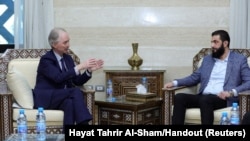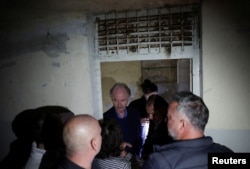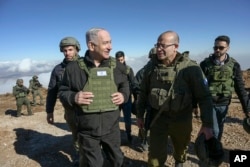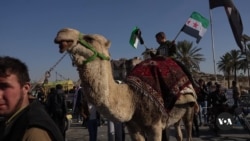The U.N. Security Council is calling for a Syrian-led political transition that allows all Syrians to “independently and democratically determine their own futures,” following the ouster of longtime leader Bashar al-Assad.
In a statement released late Tuesday, the Security Council said the political process should be based on a 2015 Security Council resolution that calls for a new constitution and U.N.-monitored elections.
It also highlighted the need to prevent the Islamic State militant group from reestablishing its capabilities in Syria where a decade ago its seized large areas in the country’s east.
The Security Council further called for Syria and neighboring countries to avoid actions that could undermine each other’s security, and specifically for Syria and Israel to not risk the safety of U.N. peacekeepers in charge of a buffer zone in the Golan Heights.
The U.N. envoy for Syria warned Tuesday that the war is not over yet, the country is fragile and facing numerous challenges, and it must rapidly move toward an inclusive political transition.
“There is a great hope that Syria now has a real chance to move toward peace, economic stability and growth, inclusion for all Syrians and accountability and justice,” Geir Pedersen told the U.N. Security Council. “But many are apprehensive about the future. The challenges ahead are enormous. I worry that, if this is not handled right – by both the Syrians and the international community – a turn for the worse again is possible.”
Pedersen briefed the 15-nation Security Council remotely from Damascus, where he met with former rebel commander and now the self-styled Commander of the New Administration, Ahmed al-Sharaa (also known as Abu Mohammed al-Jolani) and the prime minister of the caretaker authorities, Mohammed al-Bashir.
Just 11 days since a rebel offensive led to the collapse of the Assad regime and Assad’s departure to Russia, Pedersen said stability in many parts of the country is fragile and there are still active front lines in the northeast.
“Civilians must be protected wherever they are. There must be de-escalation toward a nationwide ceasefire, as well as efforts to address tensions between military factions,” he said.
Israel moves into ‘buffer zone’
Pedersen, as well as several council members, warned Israel not to be a spoiler in the Syrian process, citing both Israeli efforts to annex more of the Israeli-occupied Golan Heights and in the form of more than 350 airstrikes it has conducted across Syria since the regime collapsed on December 8.
“Israel must cease all settlement activity in the occupied Syrian Golan, which are illegal.” Pedersen said. “Attacks on Syria’s sovereignty and territorial integrity must stop.”
On Tuesday, Israeli Prime Minister Benjamin Netanyahu, accompanied by his defense minister, Israel Katz, boldly entered Syrian territory for the first time. They visited the peak of Mount Hermon (known as Jabal al-Shaykh in Arabic), which is located inside Syrian territory.
Katz said Israel will maintain a presence in what he called a ‘buffer zone” in Syria "for as long as is required." Katz said he had instructed the Israeli military to quickly establish a presence including fortifications, in anticipation of what could be an extended stay in the area.
Israel controls the Golan Heights, which it captured from Syria during the 1967 Six-day war. It later annexed the area, a move recognized by Washington, but not by the United Nations or most of the international community.
A U.N. force, known as UNDOF, monitors the ceasefire. UNDOF said Tuesday that the Israeli military presence in its area of operations “has severely impacted” peacekeepers’ freedom of movement “and its ability to conduct its operational, logistic and administrative activities.”
The U.N. mission said Israeli troops had entered the zone that they patrol, known as the area of separation, and deployed at key locations, including Mount Hermon and at least nine other positions, as well as one position east of the separation zone inside Syrian territory.
UNDOF said peacekeepers also observed IDF movements and construction at four locations in the Mount Hermon area. After Israeli troops planted their flag at three positions inside the area of separation, UNDOF protested, and they were removed.
Israel is not the only country using military force in Syria. In the northeast, Turkish forces have been acting against the Kurdish-led, U.S. backed, Syrian Democratic Forces, or SDF. A five-day ceasefire had expired, but a U.S. spokesperson said Tuesday it has been extended until the end of this week.
“As we have said publicly, we do not believe it is in the interest of any party to see increased conflict in Syria.” State Department spokesperson Matthew Miller told reporters. “We don't want to see any party take advantage of the current unstable situation to advance their own narrow interests at the expense of the broad Syrian national interest."
Humanitarian situation
After 14 years of civil war, Syria is one of the world’s largest humanitarian crises. U.N. humanitarian chief Tom Fletcher said 17 million people – more than 70% of the population -- need assistance, but there is a dramatic lack of funding for the humanitarian response.
Fletcher, who also is in Damascus, told the Security Council meeting that he was “encouraged” by his discussions with the former rebel leader al-Sharaa, and that he had committed to an ambitious scaling up of aid across borders and frontlines.
Fletcher said he would visit Aleppo on Wednesday and then go on to the Turkish capital, Ankara. Fletcher said he also expects to hold talks with Lebanese and Jordanian officials. All three countries host large numbers of Syrian refugees.
Several Security Council members, including China and Russia, called for the lifting of sanctions on Syria. U.N. envoy Pedersen has called on the United States and European Union, in particular, to consider lifting their unilateral sanctions to assist the country, which has been in an economic crisis for several years, leaving 90% of the population living in poverty.
VOA U.N. Correspondent Margaret Besheer and State Department Correspondent Nike Ching contributed to this report. Some information came from The Associated Press, Agence France-Presse and Reuters.









